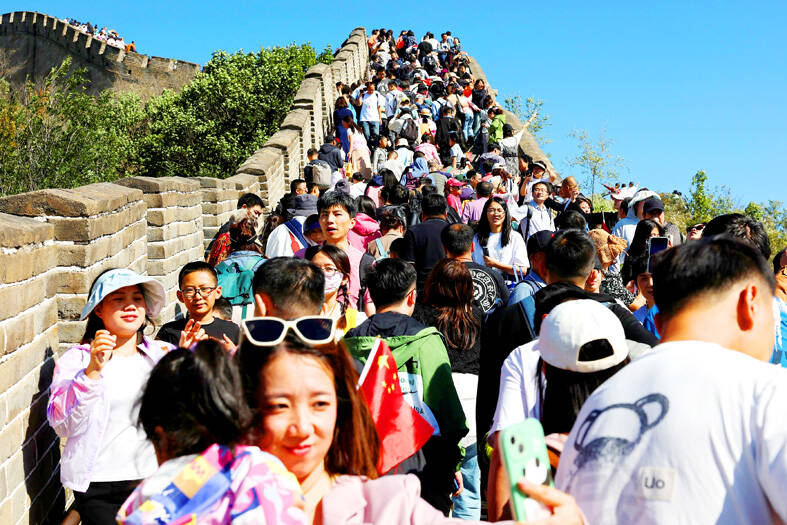Nearly 30 percent of Taipei borough wardens have joined group tours to China that were partially funded by the Chinese government, leading prosecutors probing potential Chinese interference in January’s elections to question local officials, an investigation showed.
Democratic Progressive Party Taipei City councilors Chien Shu-pei (簡舒培) and Chen E-jun (陳怡君) have reported cases of Taipei borough wardens inviting residents to join inexpensive privately organized group tours to China that were partially funded by the Chinese government.
The six-day trips reportedly cost NT$10,000 to NT$15,000, the councilors said.

Photo: Reuters
An investigation by the Liberty Times (the Taipei Times’ sister newspaper) showed that nearly 30 percent of 456 Taipei borough wardens participated in the trips, which began this year. Some met with Chinese National People’s Congress (NPC) Standing Committee members during their trips.
After the case was exposed, some participants were summoned by prosecutors for questioning, it said.
China offers the low-cost tours to borough wardens to organize private trips for local residents, who are received by an NPC Standing Committee member in China, a borough warden said on condition of anonymity.
Because the price is so low, many residents seek to join the tours and word of the trips spreads quickly, the warden said, adding that the tours have been booked through next month.
The borough wardens who were offered the packages were reportedly selected for being perceived as supporters of the pan-blue camp, they said.
As the tours began this year, it is clear that China is using them as part of its “united front” tactics to influence Taiwan’s Jan. 13 elections, they said.
China is seeking to take advantage of borough wardens’ knowledge of grassroots politics to infiltrate local communities, they added.
In some cases, apartment management committee directors are contacted to organize tours, which also include meetings with NPC Standing Committee members, they said.
Some tours were allegedly hosted by Chinese generals and included retired Taiwanese military officials, Chien said.
The government should find out who is working with the Chinese Communist Party to recruit local officials to organize the tours, she said.
Some of the borough wardens arranged lectures on election analysis during the trips, aimed at helping China interfere in the elections, she said.
Some wardens said they only joined the group tours due to peer pressure, “which is more forgivable, but if they clearly knew China’s intention and still invited people to join the tours to help Beijing carry out its ‘united front’ operations, then they need” to be held accountable for their actions, she said.
Chien said that after she questioned the city government about the issue, some borough wardens reported being asked who had leaked the information to the councilor.
However, as prosecutors are investigating the trips, some borough wardens said they were relieved that they can now easily refuse to organize tours, she added.
Taipei Department of Civil Affairs Commissioner Chen Yung-te (陳永德) said the department has reminded borough wardens that even though the trips are private, given the sensitivity of the upcoming elections, they should not go on such trips, and if they do, they should not meet with Chinese officials, to avoid contravening security and election laws.

A magnitude 5.6 earthquake struck off the coast of Yilan County at 12:37pm today, with clear shaking felt across much of northern Taiwan. There were no immediate reports of damage. The epicenter of the quake was 16.9km east-southeast of Yilan County Hall offshore at a depth of 66.8km, Central Weather Administration (CWA) data showed. The maximum intensity registered at a 4 in Yilan County’s Nanao Township (南澳) on Taiwan’s seven-tier scale. Other parts of Yilan, as well as certain areas of Hualien County, Taipei, New Taipei City, Taoyuan, Hsinchu County, Taichung and Miaoli County, recorded intensities of 3. Residents of Yilan County and Taipei received

Taiwan has secured another breakthrough in fruit exports, with jujubes, dragon fruit and lychees approved for shipment to the EU, the Ministry of Agriculture said yesterday. The Animal and Plant Health Inspection Agency on Thursday received formal notification of the approval from the EU, the ministry said, adding that the decision was expected to expand Taiwanese fruit producers’ access to high-end European markets. Taiwan exported 126 tonnes of lychees last year, valued at US$1.48 million, with Japan accounting for 102 tonnes. Other export destinations included New Zealand, Hong Kong, the US and Australia, ministry data showed. Jujube exports totaled 103 tonnes, valued at

TRUST: The KMT said it respected the US’ timing and considerations, and hoped it would continue to honor its commitments to helping Taiwan bolster its defenses and deterrence US President Donald Trump is delaying a multibillion-dollar arms sale to Taiwan to ensure his visit to Beijing is successful, a New York Times report said. The weapons sales package has stalled in the US Department of State, the report said, citing US officials it did not identify. The White House has told agencies not to push forward ahead of Trump’s meeting with Chinese President Xi Jinping (習近平), it said. The two last month held a phone call to discuss trade and geopolitical flashpoints ahead of the summit. Xi raised the Taiwan issue and urged the US to handle arms sales to

BIG SPENDERS: Foreign investors bought the most Taiwan equities since 2005, signaling confidence that an AI boom would continue to benefit chipmakers Taiwan Semiconductor Manufacturing Co’s (TSMC, 台積電) market capitalization swelled to US$2 trillion for the first time following a 4.25 percent rally in its American depositary receipts (ADR) overnight, putting the world’s biggest contract chipmaker sixth on the list of the world’s biggest companies by market capitalization, just behind Amazon.com Inc. The site CompaniesMarketcap.com ranked TSMC ahead of Saudi Aramco and Meta Platforms Inc. The Taiwanese company’s ADRs on Tuesday surged to US$385.75 on the New York Stock Exchange, as strong demand for artificial intelligence (AI) applications led to chip supply constraints and boost revenue growth to record-breaking levels. Each TSMC ADR represents